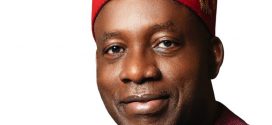BY SEGUN AYOBOLU
From my reading of the media reports of the ‘lecture’ delivered by Kaduna State governor, Mallam Nasir-El-Rufai to members of The Bridge Club in Lagos recently, it was hardly a structured or intellectually rigorous affair despite the quality of the audience. el-Rufai’s random musings on the occasion during which he largely entertained himself and massaged his own ego was of negligible analytic value because he failed to at the very least clearly define his central subject, godfatherism, which seems to be the main reason for the event. This is perhaps because he was asked the question on godfatherism in Lagos seemingly off the cuff. But was the question by Dr Muiz Banire just an accidental one? It is unlikely. The event was evidently well choreographed. Thus, he should have examined the phenomenon of godfatherism both historically and empirically in Nigeria and given a justification for his zeroing in on Lagos when there are powerful and influential politicians in practically every state in the country.
To worsen matters, when answering questions on the lecture later in Abuja, el-Rufai denied making reference to one of the National Leaders of the All Progressives Congress (APC), Asiwaju Bola Ahmed Tinubu, who is also reputed to be the chief architect and pathfinder of the developmental renaissance witnessed in Lagos over the last two decades. Yet he petulantly maintained that he stood by his position at the lecture although also saying that he did not know whether or not Tinubu was a godfather of Lagos politics.
Well then, let us try to deconstruct the notion of godfatherism as best as we can. The concept of godfatherism can be articulated in perjorative terms as El-rufai has done or in a more positive sense, which he appeared to be completely oblivious of. When the Kaduna State governor insinuates that every influential, powerful and electorally successful politician is a godfather who must be pulled down, then his sense of the term would encompass great, charismatic and astute Nigerian politicians like Dr. Nnmadi Azikwe, Chief Obafemi Awolowo, Alhaji Ahmadu Bello, Mallam Aminu Kano, Dr Michael Okpara, Dr Joseph Tarka, Chief Anthony Enahoro, General Samuel Ogbemudia, Alhaji Tafawa Balewa, Alhaji Balarabe Musa, Alhaji Aminu Kano, Alhaji Lateef Jakande, Chief Bola Ige and most of the other second republic governors to cite just a random sampling. These were mercurial politicians who were greatly beloved of their people and retained tremendous political admiration and respect in respective parts of the country throughout their lives.
el-Rufai would be conflating these illustrious Nigerian politicians and statesmen with the likes of the late Alhaji Lamidi Adedibu, fabled strong man of Ibadan politics where he was once famously described as a veritable garrison commander of the ebullient arena of Oyo state politics by no other than el-Rufai’s former godfather and benefactor, former President Olusegun Obasanjo. That genius of ‘Amala politics’ once publicly wondered why a state governor, Alhaji Rasheed Ladoja, could not allocate to him his own share of the state’s federal allocation and the heavens did not fall. Indeed, he got the governor impeached through a riotous mob, which invaded and took over the Oyo State House of Assembly until a court of law upturned the purported impeachment.
Again, Chris Uba was another example of these nefarious kinds of godfathers in Anambra state during the tenure of Dr. Chris Ngige as governor of the state. The governor was abducted in broad daylight and could have been forced to resign but for the intervention of fate and luck. His crime? : He allegedly was not abiding by the terms of oaths he had taken before the Okija shrine to materially compensate Uba financially for installing him as governor. In Edo State, comrade governor Adams Oshiomhole had to fight suffocating godfathers to a standstill, which then enabled him to lay a strong developmental foundation for the state. So El-Rufai’s use of the term godfatherism is loose, careless and imprecise.
Now, what are the roots of Tinubu’s enduring resilience in the politics of a highly sophisticated state like Lagos? During the third republic between 1991 and 1993, he joined forces with progressive elements to foster internal democracy within the defunct Social Democratic Party in Lagos State. Those were the days of the famous Professor Femi Agbalajobi versus Chief Dapo Sarumi ultimately mutually self-cancelling tussle for the governorship of Lagos State. It was in that era that Tinubu was elected to the Senate from the Lagos West Senatorial District with the highest number of votes in the country. During Chief MKO Abiola’s campaign for the presidency of Nigeria in 1993, Tinubu was not only one of his closest confidantes, he also was at the forefront of the struggle to regain Abiola’s mandate when the military annulled the election staking even his life and fortune in the process. All these endeared him to a substantial number of people not only in Lagos but across the South West. His emergence as governor of Lagos State in 1999 was thus a near fait accompli.
El-Rufai completely misses the point when he strives to portray Tinubu as the godfather with a negative and overbearing strangle hold on the politics of Lagos State. That was the line pushed by both the PDP governorship candidate in Lagos State, Mr. Jimi Agbaje, and proponents of the Kwara type ‘O to gee’ revolution In Lagos in the last election. They failed woefully. APC’s Mr. Jide Sanwo-Olu and Dr Obafemi Hamzat won an even more emphatic victory in Lagos than was the case in 2015. El-Rufai also forgets that he was part of the Obasanjo administration when federal might including the military was deployed to Lagos in a bid to ‘capture’ the state in the 2003 and 2007 elections. They failed again woefully.
Now what are the sources of Tinubu’s continuing and even growing influence not just in Lagos but in Nigerian politics even though he formally left public office 12 years ago? It is precisely because his tactics, methods and strategies are not those of a power thirsty godfather. What do I mean? As governor, Tinubu assembled the best and brightest professionals and brains into his cabinet. These were people who could hold their own in their areas of professional competence and whose opinions the governor had no choice but to respect. That is not the way of godfatherism. Power thirsty godfathers surround themselves with professional and mental Lilliputians who are too lily-livered to debate them because they want to completely dominate their environment and have no tolerance for dissenting and intelligent opinions.
Tinubu conceived of the Governors Advisory Council (GAC) when he was governor. These are individuals with wide experience in both the private and public sectors including governance who act as another layer of checks and restraints on the governor and his executive. Again, these are respected, accomplished and highly regarded politicians and statesmen whose views cannot be dismissed lightly. I am not sure that any other state has such a body. That is not the way of godfatherism. Power thirsty godfathers want as little hindrances as possible to their exercise of maximum power.
More than any other politician in this era, Tinubu has identified and discovered talents and given them ample opportunity to develop themselves and flourish as leaders in their own right. These individuals, scores of them, are doing well today in diverse spheres of governance at all levels. That is not the way of godfatherism. Ruthless godfathers hardly develop other leaders because of the fear of being subsequently overshadowed by their former mentees. In the same vein, Tinubu has facilitated and allowed the financial empowerment of many of his subordinates to become financially independent today. That is not the way of godfatherism, where the godfather wants his subordinates to remain perpetually financially dependent on him so he will remain the only star in the firmament.
el-Rufai talks with effusive glibness about good governance and qualitative leadership. He is not qualified to do so. He has no sterling record in that regard. At least we can all recall his abysmal performance at the Bureau of Public Enterprises as well as his intemperate, divisive and megalomaniac governance style in Kaduna State which overshadow whatever achievements he can claim. Luckily for him, he has profited from President Muhammadu Buhari’s cult following in the north, which has enabled him secure a second term in office. This is unlike Tinubu who not only exhibited balanced, fair and restrained leadership in a complex, plural megacity like Lagos, laid a solid foundation for the financial viability, infrastructural rejuvenation as well as governance efficacy of Lagos State but also exhibited the perspicacity to identify and support competent successors who have built admirably on his legacy and elevating Lagos continually to higher heights.
If el-Rufai and many other APC governors had their way, the John Odigie Oyegun-led National Executive of the APC would have continued in office through tenure extension without allowing party members to exercise their right to pick their leaders. This would have paved the way for elected officers on the platform of the party to also have automatic tickets to contest elections without primaries. That would have been the height of internal party dictatorship which is akin to cabalistic godfatherism. Tinubu was one of those who fought hard to enthrone intraparty democracy and empower all party members to pick party candidates for elections through direct primaries. That surely is not the way of godfatherism.
The Kaduna State governor boasted that he had defeated and retired four godfathers in Kaduna State in the last election. This is in itself an exhibition of immaturity and needless arrogance. But then that is not worth commenting on since he did not name these ghost godfathers so we can independently ascertain their political weight and worth. But when el-Rufai imperiously claims to have permanently retired these unknown four godfathers from politics, does it mean he has substituted himself for the electorate in Kaduna State in future elections? Is El-Rufai then not the newest godfather in town?
el-Rufai is amazingly simplistic in his thinking when he assumes that if the opposition is able to increase the voter turnout in Lagos to double the present number, then that will automatically guarantee victory in future elections. So he assumes that the ruling party will not also have a fair share of the support of the envisaged emergent new voters apart from embarking its own voter registration drive? He also thinks that if an opposition party can raise at least N2 billion, it will easily dislodge the godfather he appears to fear so much in Lagos. So the ruling party will not raise funds of its own to contest elections?
Perhaps the highpoint of the event was Dr Muiz Banire’s question to el-Rufai on how godfatherism could be curbed in Lagos. I thought it was Banire who should be lecturing el-Rufai on politics and not vice versa. In politics, the Kaduna governor is simply unfit to untie the lace of Banire’s shoes. And when el-Rufai insinuated that godfathers collect money to appoint or sponsor people to offices I expected Banire to have regaled the audience with juicy tales of how much he was worth in 1999 to have been able to procure the headship of two of the largest ministries in Lagos State – transportation and environment – for an unbroken period of 12 years!
 Hottestgistnaija.com
Hottestgistnaija.com




